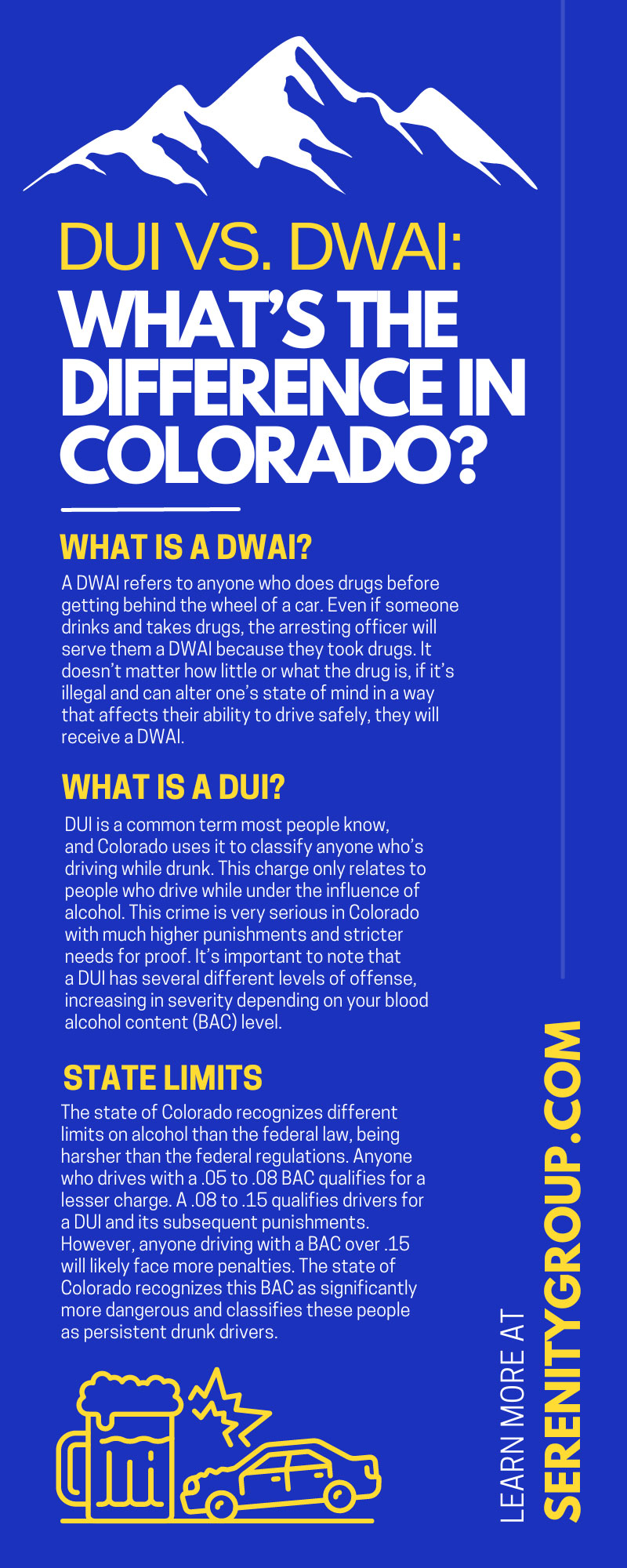DUI vs. DWAI: What’s the Difference in Colorado?

Many laws regulate driving across the country, as the activity can be dangerous and potentially deadly. Anyone driving a large vehicle needs to stay vigilant the whole trip, always be aware of their surroundings, and react to hazards in seconds. That’s why it’s illegal to drive while under the influence of drugs or alcohol. However, every state handles these cases differently, which is why you should learn the differences between DUI and DWAI in Colorado if you live there.
State Level Laws
It’s important to understand that every state oversees its laws regarding personal and commercial vehicles. Each state can establish rules like insurance requirements and legal punishments for certain activities. Therefore, each state can also use different terminology to define things, which is why DUI and DWAI are special acronyms in Colorado.
DUID and What It Means
DUID, or Driving Under the Influence of Drugs, is a legal term referring to someone who drives while intoxicated by any means. It’s also an umbrella term that contains both DUIs (Driving Under the Influence) and DWAIs (Driving While Ability Impaired). The term DUID uses the names DUI and DWAI to further delineate laws and cases.
Blood Tests
It’s important to note that Colorado tests for more than just alcohol in many situations when appropriate. You’ll likely undergo a blood test instead of a breathalyzer if you were detained for DUID in Colorado, as the professionals handling your case need to determine all the substances in your body outside of just alcohol.
DUI vs. DWAI
While it may not seem like there’s a big difference between driving ability-impaired and driving under the influence, they’re legally different. This legal separation means that the state of Colorado can set different standards for both situations. We define each term in detail below.
What Is a DWAI?
A DWAI refers to anyone who does drugs before getting behind the wheel of a car. Even if someone drinks and takes drugs, the arresting officer will serve them a DWAI because they took drugs. It doesn’t matter how little or what the drug is, if it’s illegal and can alter one’s state of mind in a way that affects their ability to drive safely, they will receive a DWAI.
Offense Severity
In most cases, Colorado categorizes DWAI as a misdemeanor. First-time offenders will likely receive a $500 fine. It’s also possible to go to jail for up to 180 days. Repeat offenders will receive a higher fine along with up to one year in prison. More charges can upgrade DWAIs to a felony, with a fine of up to $500,000 and two to six years of prison time.
Necessary Proof
DWAI is unique as it requires a very low threshold to consider someone guilty of the crime. The blood test just needs to find any ability-inhibiting drug in someone’s system, even if it’s a very small amount. Even if you feel fine driving and don’t feel any different, legally you can still be in trouble as any amount is a crime.
Effect on Your Body
The reason for this severe crackdown on driving while under the influence of drugs is that even a small amount can make driving dangerous. Just the smallest decline in physical or mental ability can result in disaster when driving on the road.
What Is a DUI?
DUI is a common term most people know, and Colorado uses it to classify anyone who’s driving while drunk. This charge only relates to people who drive while under the influence of alcohol. This crime is very serious in Colorado with much higher punishments and stricter needs for proof. It’s important to note that a DUI has several different levels of offense, increasing in severity depending on your blood alcohol content (BAC) level.
Federal Limit of Alcohol
One of the most important things to know when it comes to DUIs and drinking while driving is that it’s illegal across the country. According to federal law, it’s a Class B misdemeanor to drive while your BAC is above .08. However, many states have stricter laws, such as Colorado, qualifying anything between .05 and .08 as a DWAI and anything above .08 as a DUI.
Criminal Penalties
Because a DUI represents a higher level of danger for the community and those on the road, there are higher penalties. The state may revoke a first-time offender’s license for a year, fine them $1000, and monitor their sobriety, among other punishments. There’s also the matter of the Colorado SR-22 requirement to get back your license. Second-time offenders may lose their license forever, spend a minimum of 10 days in jail (up to a year maximum), a larger fine, and serve two years of probation. Third-time offenses qualify as felonies, which results in the same punishments as those with DWAI charges.
State Limits
The state of Colorado recognizes different limits on alcohol than the federal law, being harsher than the federal regulations. Anyone who drives with a .05 to .08 BAC qualifies for a lesser charge. A .08 to .15 qualifies drivers for a DUI and its subsequent punishments. However, anyone driving with a BAC over .15 will likely face more penalties. The state of Colorado recognizes this BAC as significantly more dangerous and classifies these people as persistent drunk drivers.
Legalized Marijuana
Recently, Colorado became one of the few states to legalize the use of marijuana. However, this doesn’t mean that every part of the legal system agrees with what this means. Currently, there’s no statute or legal change that says that you can drive while under the influence of marijuana. Therefore, ingesting marijuana is completely legal, but you can still get into legal trouble if you get behind the wheel of a vehicle afterward. In most cases, it would likely count as a DWAI, but it depends heavily on the case and the court’s decision.
All of this is to say that there’s a big difference between DWAI and DUI in Colorado, as they have vastly different repercussions. However, your best bet is to never get behind the wheel of a car if you consume alcohol or take any form of mind-altering drugs. It’s illegal and puts you and everyone else at risk for no gain.


Recent Comments